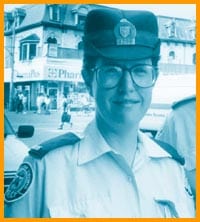The cops will ban law-breakers from their new city-wide liaison committee with the gay and lesbian community. But those who’ve been acquitted of criminal charges – like the lesbian police officer who’ll soon sit on that committee – won’t have any problems.
“There’s a number of mitigating factors,” says Acting Supt Emory Gilbert, the cop who’s running the show for the liaison committee.
“We’re not looking at small stuff. We are looking for civic minded people.”
Gilbert says that a wild and crazy youth who has stayed out of trouble for years would now have proof of their good character.
Violence and trafficking drugs, however, are no-nos.
But someone who’s breaking the law right now, yet hasn’t been charged, would be nixed. An out and proud hooker, for example, cannot sit. “It would be inappropriate if they are actually involved in a criminal act.
“Our perspective has to be… if they are involved in a criminal act, that is not consistent with the community interest [but with self interest].”
Gilbert says the gay and lesbian community is victimized by prostitution.
He says gay people care about what’s happening on their street. And that’s the focus of the committee.
“As a gay person, with a family, with a business, what is happening on their street? Is prostitution good or bad on your street? [It’s about people asking] ‘What is my community like?’ and it becomes less sexual, more about are we delivering good service in the neighbourhood…. Quality of life, protection of life and protection of property, goes beyond sexual issues.”
Two police officers will sit on the committee. Gilbert is one (he has worked at 52 Division and spent six months attending Church-Wellesley Neighbourhood Police Advisory Committee meetings).
The other is Police Const Judy Nosworthy, currently in a North York Division (she’s also served tours of duty at downtown’s 51 and 52 divisions).
She was outed at work a few years ago. More recently, she was found not guilty of an assault charge related to a domestic situation.
Nosworthy was the first of two officers to express interest in the job, says Gilbert, and she got picked; Nosworthy will be transferred to the Community Policing Support Unit full-time.
Unit staff oversee five other liaison committees. One member from each sits on another, higher-up committee that the chief himself actually chairs. The chief’s “advisory council” meets semi-annually. (He chairs only one other similar group, the youth advisory council.)
Gilbert also hopes that the last eight months of work with the gay and lesbian community stays on track, despite the recent Pussy Palace raid by five plainclothed police officers won’t hurt the process. “I would like to see the work accelerated.”
“My bottom line is, let’s move forward, let’s not let day to day issues, significant as they are, dissuade us from a long-term goal. Our agenda is about protection of the public and working together.”
No meeting has been set yet for further work on the committee by members of the gay and lesbian community.
Says Gilbert: “It is a pipeline both ways in actual fact. What we’d like to see brought to the table is getting our message out as a police service.” Gilbert wants to find out if bashings and same-sex domestic assaults aren’t being reported to police, for example, and to fix that. “It isn’t consultative inwards, it’s consultative outward.”
He’d also like to see a hiring program, with police getting gay recruits.

 Why you can trust Xtra
Why you can trust Xtra


